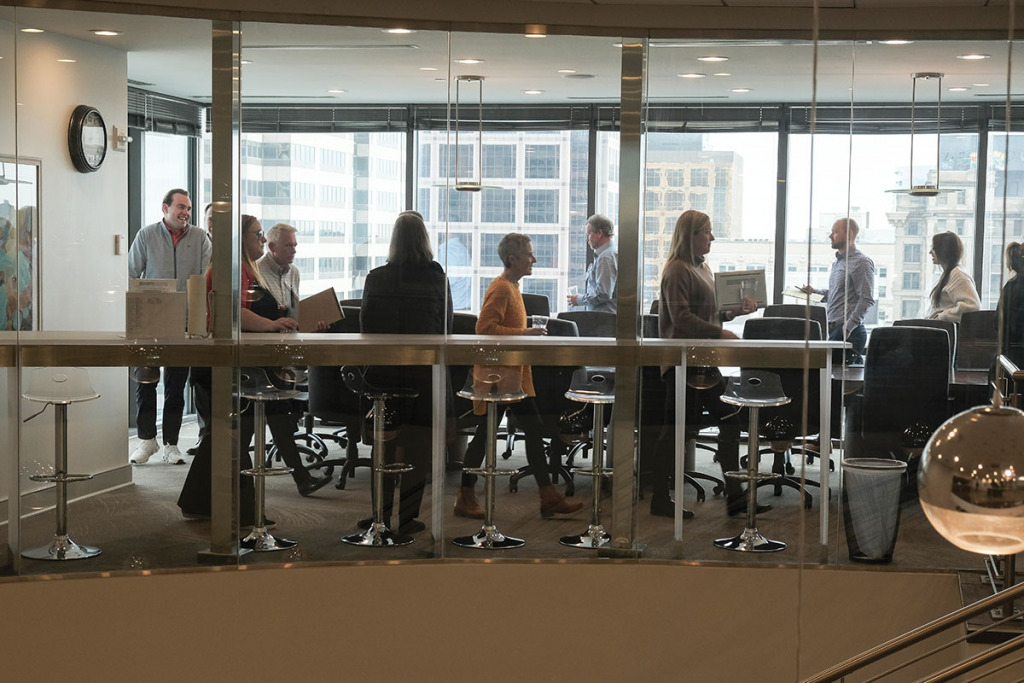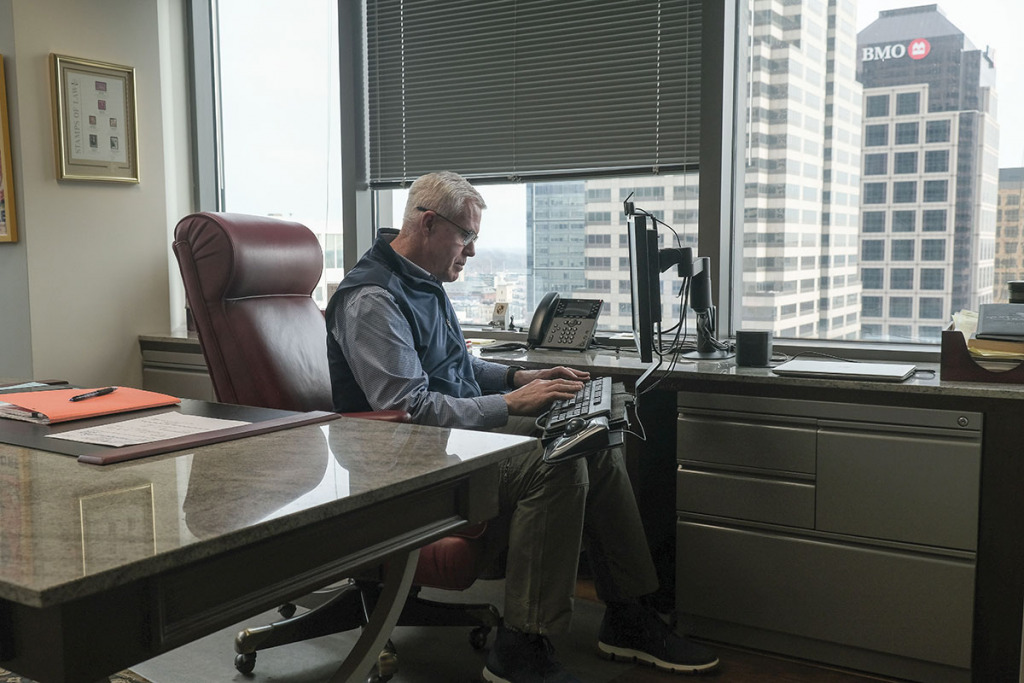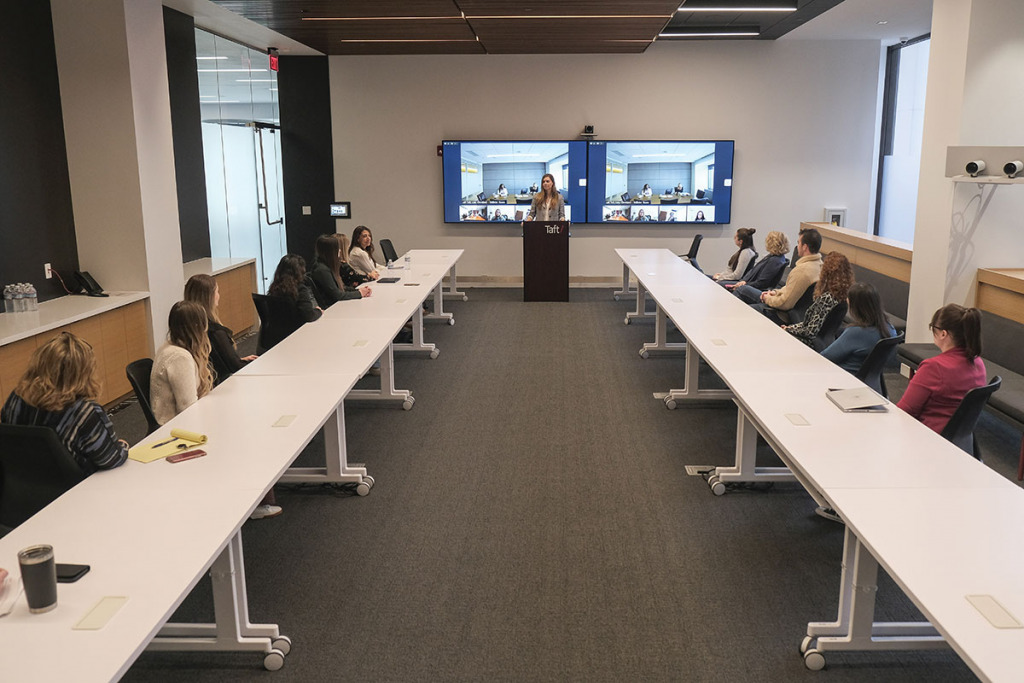Subscriber Benefit
As a subscriber you can listen to articles at work, in the car, or while you work out. Subscribe NowWhen Frost Brown Todd LLP was scouting for new space for its Indianapolis office recently, two things were clear to the law firm: It needed a smaller space and it needed to remain downtown.
“We only focused on the central business district of downtown Indianapolis,” said partner April Schilling, who works in the Indianapolis office of the Cincinnati-based firm. “It’s just sort of our culture that that is where we would be.”
Late last month, the firm moved a few blocks from its Illinois Street office into a new space in Salesforce Tower—a spot that’s as “downtown” as an Indianapolis address can be. The firm signed a 12-year lease.
And Frost Brown Todd is no outlier.
Whether they are downsizing their offices in the post-pandemic era of remote and hybrid work, holding steady or even expanding their space, downtown law firms say they have good reasons to remain in the heart of the city—from logistical concerns to the desire for a central location to the prestige factor they associate with a downtown address.
As a group, local law firms have a significant presence downtown. Of 12 large law firms surveyed, the firms occupy nearly a million square feet of combined office space and employ more than 2,100 people, most of whom come downtown to work in the office at least a few days each week.
‘Compelling reasons’
“The law firms have compelling reasons to be downtown,” said Bob Hicks, managing partner at Taft Stettinius & Hollister LLP. “We’ve built our entire infrastructure around downtown.”
Taft’s Indianapolis office occupies about 115,000 square feet in One Indiana Square, also known as Regions Tower, at 211 N. Pennsylvania St. Taft’s 245 Indianapolis workers are among the Cincinnati-based firm’s 1,300 employees in eight states plus Washington, D.C.
Law firms are also generally bullish on the concept of in-person work, though few of their employees are mandated to be at the office five days a week.
Mentoring younger colleagues and building personal connections are especially important in the practice of law, said Joe Skeel, executive director of the Indiana State Bar Association. “All of those things are much more difficult to do remotely.”
The challenge, Skeel said, is how to provide that mentoring and relationship-building while also offering the flexibility employees want. “The workforce is demanding it, and I think firms know that, and they’re trying to figure out how to work within this new construct.”
In late January, Frost Brown Todd moved from its 56,400-square-foot space at 201 N. Illinois St. to Salesforce Tower. Employees are working in a temporary spot while construction crews ready the firm’s permanent office, a 37,762-square-foot space elsewhere in the tower. That new space was vacated by another law firm, Greenville, South Carolina-based Ogletree Deakins Nash Smoak & Stewart PC, which itself moved to a smaller downtown space—a 27,170-square-foot office at 300 N. Meridian St.
Schilling said Frost Brown Todd was looking for a smaller space because of the firm’s remote work policy, adopted in April 2022. About 60% of employees have a hybrid schedule, working in the office some days and remotely others. Another 35% of workers are in the office full time, while 5% are entirely remote.
At its previous office, Schilling said, everyone had their own office. Now, employees who are in the office at least three days a week likely have their own office. But others share “hoteling” spaces—offices that are not assigned to any particular person.
Frost Brown Todd was committed to staying downtown for a few reasons, Schilling said, including proximity to the state and federal courthouses and being in a location that’s central for employees. Another factor: the lure of being in a big downtown office building.
Schilling said a number of the firm’s attorneys, particularly the younger ones, specifically wanted to work in an office tower rather than a low-rise downtown building. “That just felt to them like what big law firms do—that they’re in a high floor in a high-rise tower.”
The prestige factor
Indeed, other firms said a downtown location is a key part of their identities.
“It defines us. We’re an Indianapolis-headquartered firm,” said Greg Feary, a partner at Scopelitis Garvin Light Hanson & Feary PC.
Scopelitis is the only law firm in the country devoted entirely to the transportation and logistics industries, and it serves its more than 5,000 clients from 11 offices around the United States.
The firm occupies the 14th and 15th floors of the Market Tower building at 10 W. Market St., with 32,000 square feet of space, including a sweeping lobby staircase, custom finishes in some of the partners’ offices—Feary’s office has a wood floor—and a boardroom with a 60-seat table and an eye-popping view of Monument Circle.
“It’s not just Class A space to present an appropriate image to our client base, but it’s also for recruiting the top attorneys,” Feary said. “We recruit attorneys from all over the country and top administrative and IT people.”
Being downtown also puts the office in proximity to urban amenities, such as sports and entertainment venues and restaurants that aren’t necessarily available in the suburbs. For both client-entertainment purposes and for employees, Feary said, “we think that’s a draw.”
The firm asks its non-attorney employees to be in the office at least three days a week, including every Wednesday. Attorneys are encouraged to be in the office “as much as possible,” he said, though the firm doesn’t strictly police that.
Regarding downtown as a whole, Feary said, “Certainly, things feel like they’re getting back to normal after COVID.” But he also noted Circle Centre Mall, in its current condition, “is not a positive for downtown.”
Scopelitis’ current lease runs through the end of 2027.
Taft has actually expanded its downtown space recently and is eyeing still more growth.
In 2018, the firm signed a 15-year lease extension and did a refresh of its office space, including new carpet, paint, lighting, upholstery and furniture. In September 2019, Taft opened a 5,000-square-foot conference center and event space for firm events.
Of course, the firm couldn’t have known then about COVID-19 and the acceleration it would provide to the remote-work trend. But the firm stands by its commitment to downtown, Hicks said: “I do not regret for one moment extending our lease and upgrading the space.”
In 2020, Taft expanded its office space by taking over an additional floor that had been occupied by fellow law firm Krieg DeVault LLP. And Taft is eyeing yet another expansion within the same building, Hicks said.
Like Feary, he said having a nice office helps the firm attract talent.
“We see space as a competitive advantage to hiring new lawyers,” he said. “The fixing-up of offices used to be about impressing clients. Now, I think it’s about impressing the workforce.”
Flexible but office-oriented
Taft doesn’t have strict in-office policies, Hicks said, but employees are expected to be in the office more often than not. Legal assistants and other non-attorney staff can work from home one day a week. Attorneys have their own offices even if they’re not in the office five days a week.
Hicks said remote work was becoming more common even before the pandemic, but he doesn’t envision that Taft will ever go fully remote.
“We don’t think that’s a really good place for us. Our business is too team-oriented for that,” he said. “The law business is very much a people business.”
Krieg DeVault is one of the few local firms that has both downtown and suburban offices. The Indianapolis-based firm has been at One Indiana Square, the same building as Taft, since the 1970s. A smaller Carmel office, at 12800 N. Meridian St., opened about 20 years ago.
Because many of the firm’s clients are either downtown or in the northern suburbs, “we have the two offices because we wanted to be where our clients are,” said Managing Partner Mike Messaglia.
Currently, 77 of the firm’s employees work primarily in the downtown office, while 47 report to the Carmel office. Messaglia said he hasn’t seen a big shift in which office attorneys are working from post-pandemic, adding that the attorneys have always had the flexibility to work from either office.
Krieg DeVault asks its attorneys to be in the office three or four days a week. Non-attorney employees are expected to be in the office at least four days a week, working remotely once a week if they choose.
In surveying its staff, Messaglia said, “what we found was, very few people want to work in the office five days a week—but also very few people want to work at home five days a week.”
Krieg DeVault’s lease on its downtown space comes up for renewal in late 2025, and Messaglia said the firm has already taken some preliminary steps to evaluate its space needs.
But, he added, “I think it’s too early to conclude what we’ll do.”•
Please enable JavaScript to view this content.









